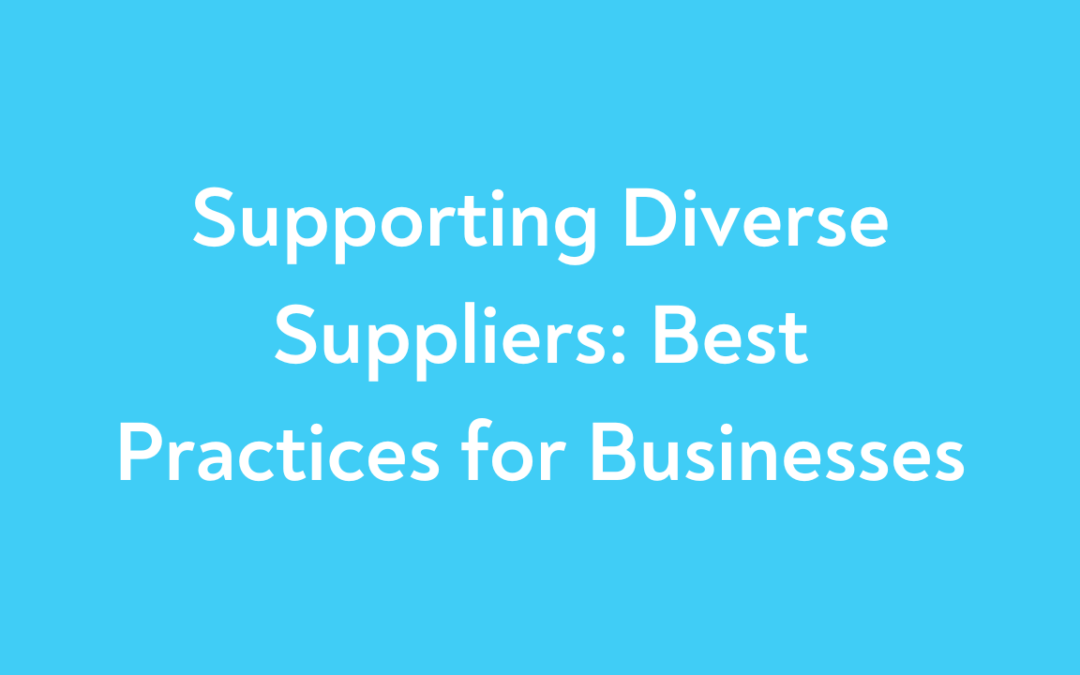Supplier diversity, which involves incorporating businesses owned by minorities, women, veterans, LGBTQIA+ individuals, and other historically underrepresented groups into your corporate supply chain, fosters innovation, resilience, and competitiveness. However, supplier inclusion efforts don’t end with simply adding diverse suppliers to your supply chain; it’s crucial to genuinely support their growth and success. Proactive, empathetic, and respectful engagement with diverse suppliers builds an inclusive, equitable, and thriving business ecosystem.
How to Support Diverse Suppliers Authentically
Supporting diverse suppliers goes beyond empty gestures—it involves a sincere commitment to fostering an inclusive supply chain and supporting the growth and success of diverse suppliers. Here’s how businesses can genuinely support diverse suppliers:
- Be intentional: Support for diverse suppliers should be an integral part of your business strategy, not an afterthought. This means investing time and resources into finding qualified diverse suppliers, incorporating them into your supply chain, and working collaboratively to support their growth and success.
- Provide capacity-building opportunities: Many diverse suppliers are small businesses that could benefit from training and development opportunities. Offer mentorship programs, provide access to educational resources, and consider sponsoring diverse suppliers to attend industry events and workshops.
- Encourage innovation: Diverse suppliers often bring fresh perspectives and innovative ideas to the table. Encourage them to share their ideas and consider ways to collaborate on innovative projects.
- Foster long-term relationships: Building strong, long-term relationships with diverse suppliers can lead to mutual growth and success. Regularly communicate with your diverse suppliers, provide feedback, and invest in the relationship for the long haul.
- Practice fair procurement: Ensure your procurement processes are transparent, fair, and accessible. Simplify the procurement process, provide clear information, and implement fair evaluation criteria.
Best Practices for Supporting Diverse Suppliers
Here are some best practices businesses can adopt to support diverse suppliers:
- Establish a supplier diversity program: A formal supplier diversity program can provide a framework for identifying, engaging, and supporting diverse suppliers. This program should be aligned with your company’s broader diversity and inclusion efforts.
- Partner with diversity-focused organizations: Partnering with organizations like Hire Ground can provide you with access to a wide network of diverse suppliers. These organizations can also provide resources and guidance to help you effectively support your diverse suppliers.
- Set diversity goals and track progress: Set clear, measurable goals for your supplier diversity efforts, and regularly track your progress. This will ensure accountability and allow you to identify areas for improvement.
- Celebrate and promote diverse suppliers: Regularly highlight your diverse suppliers on your platforms. This not only gives them exposure but also shows your commitment to supplier diversity.
Real-World Examples of Supporting Diverse Suppliers
Many large corporations are leading the way in supporting diverse suppliers. For instance, IBM’s supplier diversity program, in operation since 1968, focuses on developing and engaging diverse suppliers. IBM offers a variety of programs aimed at building the capacity of diverse suppliers, including mentoring programs and educational resources.
Similarly, Procter & Gamble has a robust supplier diversity program that includes providing diverse suppliers with access to training and development opportunities. They also have a dedicated supplier diversity team that works closely with diverse suppliers to ensure their success.
These examples demonstrate that it’s not just possible, but also beneficial, to genuinely support diverse suppliers. Other corporations can take cues from these examples and implement similar practices to bolster their own supplier diversity efforts.
By supporting diverse suppliers, businesses not only foster an inclusive supply chain but also contribute to a more equitable business landscape. However, this support must be genuine, thoughtful, and respectful. By adopting these best practices and committing to the genuine support of diverse suppliers, businesses can drive innovation, foster resilience, and contribute to an inclusive future.
Key Takeaways:
- Genuine support for diverse suppliers is essential for building an inclusive, equitable, and thriving business ecosystem.
- Businesses should be intentional in their support, investing time and resources into finding qualified diverse suppliers and incorporating them into their supply chains.
- Providing capacity-building opportunities such as mentorship programs, educational resources, and sponsorship for industry events can help foster the growth and success of diverse suppliers.
- Fostering long-term relationships and encouraging innovation with diverse suppliers can lead to mutual growth and success.
- Implementing transparent, fair, and accessible procurement processes is crucial for supporting diverse suppliers.
- Businesses can adopt best practices such as establishing a supplier diversity program, partnering with diversity-focused organizations, setting diversity goals and tracking progress, and promoting diverse suppliers.
- Examples of corporations leading the way in supporting diverse suppliers include IBM and Procter & Gamble, both of which have robust supplier diversity programs that include capacity-building opportunities for diverse suppliers.
- Genuine, thoughtful, and respectful support for diverse suppliers contributes to a more equitable business landscape and is a key driver of innovation, resilience, and growth.


Recent Comments